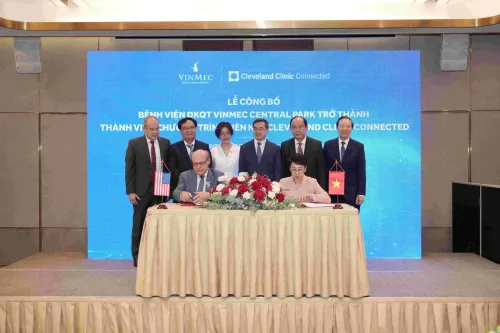Breast cancer is a silent threat, not only silently developing in breast tissue but also rapidly metastasizing to other organs if not treated promptly and accurately.

In September 2021, a female patient named N was diagnosed with stage III left breast cancer (cT2N3M0), with signs of metastasis to the left supraclavicular lymph nodes, invasive carcinoma, ER/PR negative and Her2 positive (+++) at a central hospital. This means that cancer cells have spread from the milk ducts into the surrounding breast tissue and are likely to spread to other parts of the body. At the initial hospital, the patient underwent neoadjuvant chemotherapy combined with anti-Her2 for 6 cycles to shrink the tumor before surgery.
Next, the patient underwent radical surgery to remove the tumor and performed a pathological procedure. However, after surgery, a lymph node containing cancer cells was found, indicating that the risk of cancer had not been completely eliminated. The patient continued treatment with Kadcyla, a targeted drug to reduce the possibility of cancer spreading. During treatment with Kadcyla, the patient experienced a severe complication of grade 4 thrombocytopenia - meaning the number of platelets in the blood dropped too low, increasing the risk of bleeding. Therefore, the patient had to receive 4 platelet transfusions and continued with radiation therapy to increase the effectiveness of eliminating cancer cells.
In May 2022, after completing radiation therapy, the patient was transferred to the Oncology Center, Vinmec Times City International General Hospital to continue using Kadcyla. Upon admission, the patient showed signs of new complications such as subcutaneous hemorrhage (small bruises due to thrombocytopenia) and increased liver enzymes - signs that the liver was affected by the drug. To minimize complications, the doctor adjusted the dosage of the drug according to the new regimen. Faced with complications from the patient's Kadcyla treatment, experts at Vinmec conducted a thorough consultation, weighed the benefits and risks, and decided to switch to anti-Her2 treatment for 8 cycles until October 2022. After treatment, the patient had positive changes and moved to the periodic monitoring phase.
However, recently, the patient felt mild pain in the back of the neck and discovered a small tumor in the right supraclavicular region. Through examination and ultrasound, the lymph node mass in the right neck was discovered and assessed for the risk of metastasis by doctors at the Oncology Center, Vinmec Times City International General Hospital. After performing surgery to maximally dissect the lymph nodes in the right neck, and post-operative pathology, the doctors confirmed that 8/13 lymph nodes showed signs of metastasis of carcinoma, with ER/PR negative and Her2 positive (+++). This means that cancer cells from the original tumor in the breast have spread to the lymph nodes, are in the advanced stage and at risk of further spread. The characteristic of these cancer cells is that they do not have hormone receptors ER and PR (negative), meaning that they are not affected by the hormones estrogen and progesterone, which limits the ability to treat with hormone therapy. At the same time, cancer cells are strongly Her2 positive (+++), meaning they have a lot of Her2 protein on their surface, making them easier to grow and spread.
With the condition of lymph node metastasis in the right neck area, complications from previous treatment, as well as the factor that the patient is middle-aged and has a high risk of side effects, the multidisciplinary Oncology Council at Vinmec Times City agreed to develop a personalized treatment regimen including chemotherapy combined with Her2 dual antibodies, and at the same time proposed radiotherapy to the right neck area after completing 6 cycles of chemotherapy. The patient also had a brain MRI to assess the overall health status and was placed with an injection chamber to support a more effective and safe chemotherapy regimen.
After 5 cycles with Paclitaxel and dual Her2 antibody regimen, the patient's metastatic lymph nodes had positive changes. The tumor was significantly reduced in size and number, without serious complications such as decreased blood cells or damage to liver and kidney function. During the treatment, the patient was almost not tired, did not vomit and did not have to delay the treatment as in the first treatment.
Each body is a special individual with its own physical condition, constitution and reaction, so applying a common treatment regimen can lead to different results and does not guarantee optimal effectiveness. Therefore, developing a separate regimen and adjusting the drug dosage to suit each patient is the key to bringing the best final results for the patient that the Oncology Center, Vinmec Times City International General Hospital is aiming for.
In cases of breast cancer with lymph node metastasis, especially when metastasis occurs in the supraclavicular lymph nodes, treatment needs to combine multiple modalities to achieve optimal effectiveness. With extensive experience, the team of doctors at Vinmec Times City has developed and implemented a flexible treatment regimen, including chemotherapy combined with Her2 targeted drugs and radiotherapy for the right neck area if necessary. This personalization helps to minimize side effects for patients while still achieving high treatment efficiency.
It can be seen that the coordination between experts from many fields such as chemotherapy, radiotherapy, surgery and pathology at the Oncology Center, Vinmec Times City International General Hospital not only helps to optimize the regimen but also creates a comprehensive care environment for patients throughout their journey to fight cancer, bringing positive treatment results and improving quality of life.









